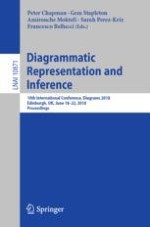2018 | OriginalPaper | Buchkapitel
Iconic Logic and Ideal Diagrams: The Wittgensteinian Approach
verfasst von : Timm Lampert
Erschienen in: Diagrammatic Representation and Inference
Aktivieren Sie unsere intelligente Suche, um passende Fachinhalte oder Patente zu finden.
Wählen Sie Textabschnitte aus um mit Künstlicher Intelligenz passenden Patente zu finden. powered by
Markieren Sie Textabschnitte, um KI-gestützt weitere passende Inhalte zu finden. powered by
